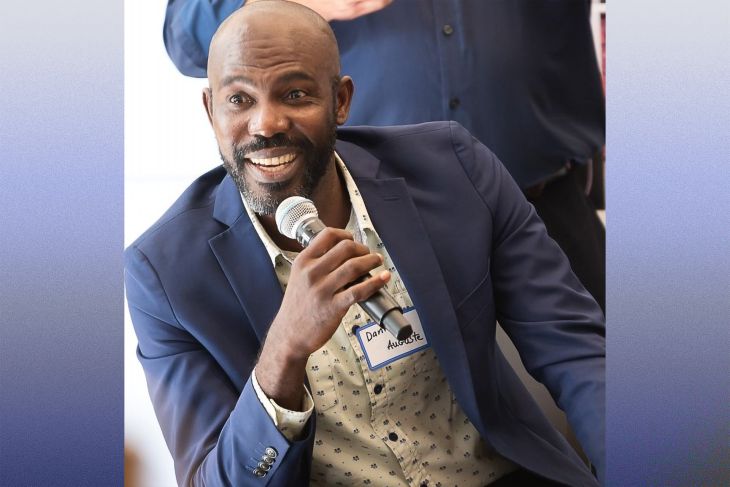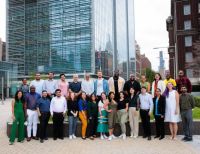A lack of access to critical resources has prevented many middle- and low-income entrepreneurs from starting successful businesses, economic sociologist Daniel Auguste told an MIT audience in a Feb. 9 presentation on barriers to entrepreneurship in under-resourced communities of America.
That’s a fundamental problem because entrepreneurship is one of society’s most significant pathways to economic security and building intergenerational wealth, according to Auguste, who is an MLK Visiting Assistant Professor at the MIT Sloan School of Management for the 2022-2023 academic year.
MIT News sat down with Auguste, who is also an assistant professor in the Department of Sociology at Florida Atlantic University and a faculty affiliate at the Social Policy Institute at Washington University, to discuss the implications of his work and how he hopes it changes things from a policy perspective.
Q: What would you consider the core focus areas and goals of your research?
A: I study the root causes and consequences of social inequalities. In doing that, I focus on the structural barriers to entrepreneurship and entrepreneurial success, considering the extent to which economic inequality undermines entrepreneurship development and success, and innovation.
What I’m trying to do is influence policies that could create a more shared economic prosperity by tapping into the full entrepreneurial potential of our society. I believe there’s a lot of untapped potential.
I’m trying to get policymakers and the academic community to understand that successful entrepreneurs emerge from a context, and the opportunity structure of that context shapes the likelihood of entrepreneurial entry, the type of entry, and the potential for success. If resources are unequally distributed by gender, race, and class, different groups will have different entrepreneurial outcomes. So, I want to show entrepreneurship as a contextual activity.
Q: What has your research on entrepreneurship among middle- and lower-income households found?
A: Some of my findings are that entrepreneurship can actually be a sign of economic insecurity, not because the founders aren’t entrepreneurial or creative, but because of the context — because they don’t have necessary resources, like the wealth endowment, access to credit, or the networks, to launch successful businesses. It shows that having a good job with benefits like insurance and a pension could be a better way for low-resource communities to achieve social mobility. But it’s a Catch-22 because successful entrepreneurship is a better way to build intergenerational wealth than simply working for a firm.
Focusing on race, Black entrepreneurs are at the lower end of the education strata and there are fewer successful Black entrepreneurs. It’s also a wealth story because in order to be successful you need resources. Wealth gives you the luxury to fail in entrepreneurship. That’s important because entrepreneurship is very risky and you’re often learning as you go. If you fail and now can’t afford to not pay your rent, it’s about survival. Ultimately, if your network, like family and friends, are low-resource, and your community is low-resource, it’s difficult to support high-growth entrepreneurial or innovative activities.
After college you might need a job to support your parents, as opposed to your parents supporting you in the early stages of the entrepreneurial process — when personal capital is really important. Basically, Blacks more often face financial instability, and it leads to racial disparities in business creation and success. It shows that entrepreneurship may not be a path to social mobility for everyone because of the structure of opportunity and lack of resources in certain communities.
There are still going to be entrepreneurs in those communities, but they are going to be survivalist, necessity-driven entrepreneurs using it as an alternative to unemployment or underemployment until they get a better option. You wouldn’t want to create an economy on these entrepreneurs. You couldn’t sustain an innovative economy based on survivalist entrepreneurs, but extreme wealth and income inequality increase the proportion of entrepreneurs who are basically using it as a survival mechanism.
Q: How do you hope your research informs discussions about how to address inequality and economic mobility?
A: I hope to promote in policy discussions the idea that working to reduce economic inequality is actually working to unlock the entrepreneurial and innovative potential of society. I hope to highlight that entrepreneurship is not currently a viable path to economic mobility for everyone because of the resource constraints of many communities.
Policy makers should understand that successful entrepreneurs don’t fall from the sky or happen by accident. We get them because of investment in the entrepreneurial ecosystem. It matters what families and communities from which they emerge. The resource endowment of these families shapes the entrepreneurial potential of these people and therefore of the economy. We can change entrepreneurial outcomes by investing in these low-resource communities, by doing things like improving access to financial capital and home ownership, and starting to see entrepreneurs as people that emerge from a community.







